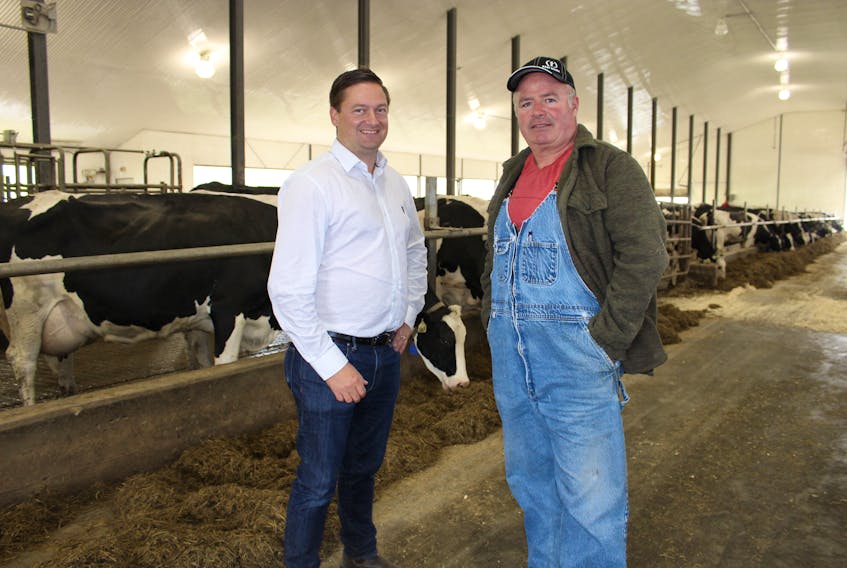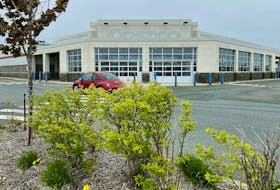ST. JOHN'S, N.L. — The Dairy Farmers of Newfoundland and Labrador (DFNL) has launched a campaign — “No Bull” — to revitalize the province's milk industry and promote what they say is the best milk product in the country.
“We are extremely happy with the campaign,” Crosbie Williams of Pondview Farms in the Goulds said Tuesday.
“It’s about milk, whole milk and nothing but milk, a product we have here that is local, sustainable, and with the idea food security from this product will be prominent in people’s minds."
The DFNL “No Bull” campaign is a response to a drop in milk sales in the province — a trend being seen across the country and internationally.
Fluid milk sales in Newfoundland and Labrador have decreased by 11 per cent over the past five years.
“It’s about milk, whole milk and nothing but milk, a product we have here that is local, sustainable, and with the idea food security from this product will be prominent in people’s minds." — Crosbie Williams
The dairy industry has an annual provincial economic impact of more than $100 million, and DFNL says a continued decline in milk sales will not only affect local farmers and the local economy, it will threaten the future of dairy sustainability in the province.
“Making sure we have access to fresh, local food is always a concern in our province,” Williams said.
“By having our own farms, our own cows, and local processing, we’re able to supply fresh, local milk, year-round. It’s important that we have our own local dairy industry right here in Newfoundland and Labrador.”
Williams' farm features 250 head of dairy cattle in its barn, a host of secondary buildings on the property for storage of machinery and supplies, and is located next to the family home at 80 Forest Rd. in Goulds.

To help determine what factors might be contributing to the decline in milk sales, DFNL worked with a local agency to conduct research regarding milk usage and dairy perceptions amongst Newfoundland and Labrador consumers.
DFNL general manager John Moores said the research revealed a series of misperceptions about dairy overall and about dairy in Newfoundland and Labrador in particular.
“We learned that many people didn’t know that our milk is actually from right here in Newfoundland and Labrador,” Moores said.
“They also didn’t know that Newfoundland and Labrador milk is antibiotic-free, preservative-free, has no added growth hormones, has no additives — other than vitamins A and D — and is high in nutrients.”
Instead of drinking dairy, people today tend to eat more dairy or use the many products that are milk alternatives. Some people have no choice, but the majority of studies show that drinking the man-made products is not necessary.
Moores also noted that many research participants mentioned the importance of providing their families with healthy food options, yet some were unaware of milk’s health benefits.
“Many people weren’t aware that both regular and chocolate milk naturally contain 15 essential nutrients, making it a very nutrient-dense food,” Moores said.
“Especially for children, milk provides calcium, magnesium and Vitamin D that contribute to bone health and helps build children’s skeletal structures.”
Moores said the industry in this province is large and in order for it to get back into the market like it was in previous generations, a host of myths about what is actually in the milk product has to be debunked.
“We used to import about 90 per cent of our grain. One hundred per cent of our forage is now grown here in Newfoundland and Labrador and we use very little imported feed,’’ Williams said.
“This is not related to what this campaign is about, but we have found that Timothy Clover works best here, for our growing conditions,’’ he added.
Williams said he would like to have Alfalfa crops, but they don’t grow well here.
“I want people to know that our colourful cartons of milk haven’t been shipped in from somewhere else,” Williams said.
“It’s local, sustainable and a great nutritional option for families. When you buy Newfoundland and Labrador milk, you’re supporting a local industry and helping ensure food security in our province.”
The “No Bull” campaign will run until December, and local dairy farmers hope it will help people feel more confident about buying local milk.









